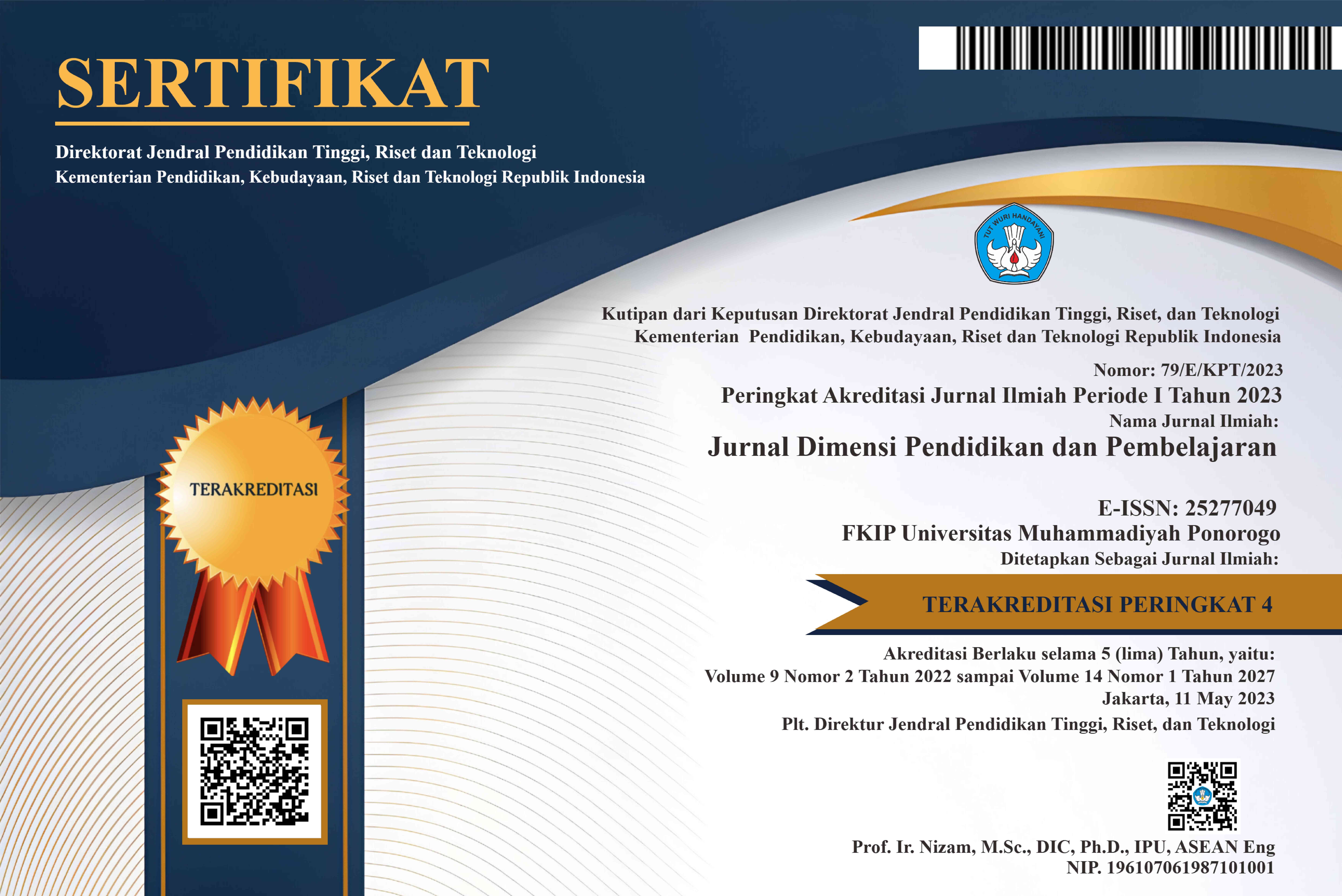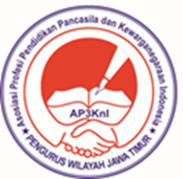Pengaruh Penerapan Kebijakan Pembelajaran Daring Terhadap Hasil Belajar Mahasiswa Di PG PAUD Universitas PGRI Argopuro Jember
DOI:
https://doi.org/10.24269/dpp.v11i1.6196Abstract
In the implementation of online learning policies during the Covid 19 pandemic at PGRI PAUD Universitas PGRI Argopuro Jember, when viewed from the existing obstacles, it will affect student learning outcomes at PG PAUD Universitas PGRI Argopuro Jember. The intended learning outcomes are the results obtained by students from the results of lecturer assessments in lecture activities in one semester. The research method used in this research uses a quantitative approach. This research is to measure and assess what effect the implementation of online learning policies has on student learning outcomes in the PG PAUD Undergraduate Study Program, PGRI Argopuro University, Jember. Researchers use observation sheets in data collection. The respondents in this study were 90 students consisting of semester 1 and semester 3 students of the PG PAUD Undergraduate Program at PGRI Argopuro University Jember. The results of the research analysis show that there is an influence on the application of online learning policies on student learning outcomes at PGRI PAUD University and PGRI Argopuro Jember. This was obtained because the sign value was between 0.01 and less than 0.05, so the online policy in this study had an effect on student learning outcomes. Meanwhile, the correlation/relationship value is 0.366, and from the results of this output, an R square of 0.127 is also obtained, which means that the influence of online learning policies is 12.7% on student learning outcomes.
Â
References
Aji, Rizqon Halal Syah. (2020). Dampak Covid-19 Pendidikan di Indonesia : Sekolah, Keterampilan, dan Proses Pembelajaran. Jurnal Sosial dan Budaya Syar-I Fakultas Syariah dan Hukum UIN Hidayatullah Jakarta, 7 (2):395-402.
Ayu, M. (2020). Online learning: Leading e-learning at higher education. Journal of English Literacy Education, 7(1), 47-54
Bilfaqih, Y., & Qomarudin, M. N. (2015). Esensi Penyusunan Materi Pembelajaran Daring. Yogyakarta: Deepublish.
Dahlan, M. S. (2016). Statistik Untuk Kedokteran dan Kesehatan. Jakarta: Salemba Medika.
Darmawan, D. (2019). Metode penelitian kuantitatif. Bandung: Remaja Rosdakarya.
Dhawan, S. (2020). Online learning: A panacea in the time of COVID-19 crisis. Journal of Educational Technology Systems, 49(1), 5-22
Sukriswati. (2016). Upaya Peningkatan Hasil Belajar Pkn Materi Lembaga Pemerintah Pusat Melalui Model Cooperative Tipe Make A Match Kelas IV SDN 2 Gerduren Semester Genap Tahun Pelajaran 2015/ 2016. Academy OfEducation Journal. Fakultas Keguruan Dan Ilmu Pendidikan, 7(1), 16–22.
Haerul, Akib, H., & Hamdan. (2016). Implementasi Kebijakan Program Makassar Tidak Rantasa di Kota Makassar . Jurnal Administrasi Publik, 6(2), 21-34.
Handayani, Rina Tri, dkk. (2020). Pandemi Covid-19, Respon Imun Tubuh, dan Herd Immunity. Jurnal Ilmiah Permas : Jurnal Ilmiah STIKES Kendal. 10 (3): 373-380.
Hariyanti, T., Prabandari, Y. S., Ilmu, L., Masyarakat, K.,. (2020). Kedokteran, F., Brawijaya, U., Kedokteran, F., Gadjah, U., & Yogyakarta, M (n.d.). Health
Isman, M. (2017). Pembelajaran Moda Dalam Jaringan (Moda Daring). The Progressive And Fun Education Seminar, 586–588.
Kuntarto, E. (2017). Keefektifan Model Pembelajaran Daring dalam Perkuliahan Bahasa Indonesia di Perguruan Tinggi. Journal Indonesoian Language Education and Literature (ILEAL). 3(1): 99-110. ISSN: 2502-2261.
Mansur, R. (2018). Belajar jalan perubahan menuju kemajuan. Vicratina: Jurnal Pendidikan Islam, 3(1).
Maulana, Hutomo Atman & Hamidi, Muhammad. (2020). Persepsi Mahasiswa terhadap Pembelajaran Daring pada Mata Kuliah Praktik di Pendidikan Vokasi. Jurnal Equilibrium: Jurnal Pendidikan. VIII. 2, 224-231.
Pangondian, R. A., Santosa, P. I., & Nugroho, E. (2019). Faktor - Faktor yang Mempengaruhi Kesuksesan Pembelajaran Daring dalam Revolusi Industri 4.0. Seminar Nasional Teknologi Komputer & Sains (SAINTEKS), 1(1), 56– 60.
Pratiwi, E. W. (2020). "Dampak COVID-19 Terhadap Kegiatan Pembelajaran Online Di Sebuah Perguruan Tinggi Kristen Di Indonesia". Perspektif Ilmu Pendidikan, Volume 34, Nomor 1.
Pujiastutik, H. (2019). Efektifitas penggunaan media pembelajaran e-learning berbasis web pada mata kuliah Belajar Pembelajaran I terhadap hasil belajar mahasiswa. Jurnal Teladan, 4(1), 25-36.
Ratnawati, A. T., Amdad, A., & Nurdiati, D. S. (2018). Upaya ibu hamil risiko tinggi untuk mencari layanan persalinan di puskesmas Waruroyo. BKM Journal of Community Medicine and Public Health, 67-71.
Rati, Ni W., Kusmaryatni, Nyoman, & Rediani, Nyoman. (2017). Model Pembelajaran Berbasis Proyek, Kreativitas Dan Hasil Belajar Mahasiswa. Jurnal Pendidikan Indonesia. 6(1): 60-71. E-ISSN: 2541-7207
Yanti, M.T., Kuntarto, E. dan Kurniawan, A.R. (2020). Pemanfaatan Portal Rumah Belajar Kemendikbud sebagai Model Pembelajaran Daring di Sekolah Dasar. Adi Widya: Jurnal Pendidikan Dasar. 5(1): 61-68. ISSN: 2685-8312.
Downloads
Published
Issue
Section
License
Copyright
Authors who publish their manuscripts in this journal agree to the following terms:
- The copyright on each article belongs to the author.
- The author acknowledges that Jurnal Dimensi Pendidikan dan Pembelajaran has the right to be the first to publish under a Creative Commons Attribution 4.0 International (Attribution 4.0 International CC BY 4.0) license.
- Authors may submit articles separately, arranging for the non-exclusive distribution of manuscripts that have been published in this journal to other versions (e.g., sent to the author's institutional repository, publication into books, etc.), acknowledging that the manuscript was first published in the Jurnal Dimensi Pendidikan dan Pembelajaran.
Â
License
Use of the article will be governed by the Creative Commons Attribution license as currently published under the Creative Commons Attribution 4.0 International License (Attribution 4.0 International (CC BY 4.0).
Â
This license permits anyone to copy and redistribute this material in any form or format, compose, modify, and make derivatives of this material for any purpose, including commercial purposes, as long as they give credit to the author for the original work.



_001.jpg)



